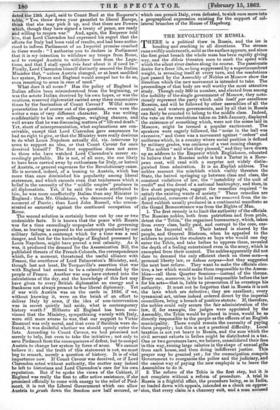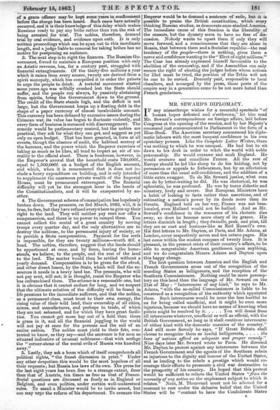THE REVOLUTION IN RUSSIA. T HERE is a political thaw in
Russia, and the ice is bending and cracking in all directions. The stream runs swiftly underneath, solid as the surface appears, and since the first great breach the whole mass has been rapidly giving way, and the debris threaten soon to mark the speed with which the silent river dashes along its course. The passionate desire for a freer life, so long suppressed by a supernicumbent weight, is revealing itself at every turn, and the resolutions. just passed by the Assembly of Nobles at Moscow show the direction which the new movement is intended to take. The proceedings of that body are well worthy the most attentive study. Though only 300 in number, and elected from among the nobility of the single government of Moscow, they noto- riously represent the party which calls itself par excellence Russian, and will be followed by other assemblies of all the central and western governments, and by all that in Russia can fairly be counted to belong to the middle class. Indeed, the vote on the resolutions taken on 24th January, displayed the existence of something which, were not the scene laid in Moscow, might be termed a popular excitement. The speakers were eagerly followed, the "noise in the hall was excessive," and there was a movement against "orders" and uniforms which, in a country where social position is defined by military grades, was ominous of a vast coming change. The nobles "said what they pleased," and they have drawn up an address to the Emperor which Englishmen, educated to believe that a Russian noble is but a Tartar in a Euro- pean coat, will read with a surprise not widely distin- guished from admiration. It is an English address. The nobles recount the mischiefs which visibly threaten the State, the hatred springing up between class and class, the constant violations of law, the "instability of the unit of credit" and the dread of a national bankruptcy, and then, in five short paragraphs, suggest the remedies required "to satisfy the existing wants of society." These remedies are all practical, measures of detail, as far removed from the in- flated rubbish usually produced in a continental manifesto as the Grand Remonstrance was from the Rights of Man.
1. The first remedy is to limit the authority of the officials. The Russian nobles, both from patriotism and from pride, detest the "Tchin," the organized bureaucracy, which, taken from every class, badly paid, and corrupt to the core, exe- cutes the Imperial will. Their hatred is shared by the people, and General Biistrom, when he appealed to the soldiers to punish the students as boys who would one day enter the Tchin, and take bribes to oppress them, revealed the depth of a feeling entertained even in the army, which is exempted from their control. The nobles apparently did not dare to demand the only efficient check on these men—a personal liberty law, or habeas corpus—but they suggested the next best reform. They want to make the officials elec- tive, a law which would make them responsible to the Assem- blies—call them Quarter Sessions—instead of the throne. Every one, moreover, is to be held responsible before the law for his acts—that is, liable to prosecution if he oversteps his authority. It must not be forgotten that in Russia it is not the laws which are defective; they are excellent; every tyrannical act, unless indeed ordered direct by the imperial councillors, being a breach of positive statute. If, therefore, the nobles could only secure the fair administration of the law, if, for example, the judges were appointed by the Assembly, the Tchin would be placed in irons, would be as directly responsible to the people as the officers of an English municipality. There would remain the necessity of paying them properly ; but this is not a practical difficulty. Local taxation is not yet heavy in Russia, and the sum which the civil servant extorts in tribes might be distributed in a tax. One or two governors have, we believe, consolidated their fees in this way, raising large salaries in the shape of annual • from each house, and then doing indifferent justice. prayer may be granted yet ; for the emancipation compels Government to reorganize the police and the judiciary, and the easiest way of paying the new employes is to leave the Assemblies to do it.
2. The reform of the Tobin is the first step, but it is not complete without a reform of procedure. A trial in Russia is a frightful affair, the procedure being, as in India, so loaded down with appeals, intended as a check on oppres- sion, that every claim is a chancery suit, and a man accused of a grave offence may be kept some years in confinement before the charge has been heard. Such cases have .actually occurred, and it is their knowledge of this delay which makes Russians ready to pay any bribe rather than run the risk of being arrested for trial. The nobles, therefore, demand trial by oral evidence, and evidence upon oath. It is only written proceedings which can be spun out to this inordinate length, and a judge liable to removal for taking bribes has no motive for postponing an audience. 3. The next step is to right the finances. The Russian Go- vernment, forced to maintain a European position with only an Asiatic revenue, has, for a century past, struggled with financial entanglements. Of the thirty-five millions a year which it raises from every source, twenty are derived from a spirit monopoly, which has compelled it to order the priests to urge the people to drink. A teetotal movement started some years ago was wilfully crushed lest the State should suffer, and the people can always, by passively abstaining from spirits, bring the Government down to the ground. The credit of the State stands high, and the deficit is not large, but the Government keeps up a floating debt in the shape of a paper currency of almost incalculable amount. This currency has been debased by excessive issues during the Crimean war, its value has begun to fluctuate violently, and every form of business is menaced with disarrangement. The remedy would be parliamentary control, but the nobles are practical, they ask for what they can get, and suggest as yet only an open budget. That has been granted, in form at all events, though the absence of audit, the habitual secrecy of the bureaux, and the power which the Emperor exercises of taking as much as he likes, all tend to impart an air of un- reality to the official sheet. There is frankness, however, in the Emperor's avowal that the household costs 760,000/., equal to 1,500,000/. on a budget of the English amount, and which, when it is remembered that it does not in- clude a heavy expenditure on building, and is only intended to supplement the enormous private wealth of the Imperial House, must be pronounced extravagant. The financial difficulty will yet be the strongest lever in the hands of the Constitutionalists, and it will be exasperated by an- other.
4. The Government scheme of emancipation has hopelessly broken down. The peasants, on 3rd March, 1863, will, it is true, be free, but they have refused everywhere to give up their right to the land. They will neither pay rent nor offer a compensation, and there is no power to compel them. You cannot collect the rental of a great country by moving troops every quarter day, and the only alternatives are to destroy the noblesse, to the permanent injury of society, or to provide A State compensation. Payment for the serfs is impossible, for they are twenty millions—worth 40/. a head. The nobles, therefore, suggest that the lands should be apportioned at once, and by force, leaving the home- steads, we believe, to the people, and the rest of the land to the lord. The matter would then be settled without a yearly demand. Compensation is to be given for the obrok, and other direct losses, by the State, which will find the re- sources it needs in a heavy land tax. The peasants, who will not pay rent, will not, it is thought, resist the Emperor who has enfranchised them. The scheme is a reasonable one, but it is obvious that it cannot endure for long, and we suspect that the ultimate solution of the difficulty will be found in life pensions to the immediate sufferers, and that the nobles, as a permanent class, must trust to their own energy, the rising value of their wild land, their ownership of all cities, mines, and manufactures, and perhaps to trade, of which they are not ashamed, and for which they have great facili- ties. You cannot get more hay out of a field than there is grass in it, and all the financial juggling in the world will not pay at once for the persons and the soil of an entire nation. The nobles must yield to their fate, con- tented to know, as they say—and the sentence is for men so situated indicative of unusual nobleness—that with serfage the "corner-stone of the social evils of Russia was knocked away."
5. Lastly, they ask a boon which of itself comprehends all political rights, the freest discussion in print." Under any other despotism this would be the most hopeless of all their requests ; but Russia has laws of its own. The press for the last eight years has been free to a strange extent, freer than that of Austria, ten times as free as that of France. Social questions are discussed as freely as in England or Belgium, and even politics, under certain well-understood rules. To assail a Minister would be to invite arrest, but one may urge the reform of his department. To censure the Emperor would be to demand a sentence of exile, but it is possible to praise the British constitution, which every thinking Russian studies, as democrats once studied America. The immediate cause of this freedom is the liberality of the censors, but the dynasty seem to have no fear of dis- cussion. Nobody wants to upset them if only they will move forward, and a consciousness that they are alone in Russia, that between them and a Socialist republic—the real tendency of the people—there is nothing, gives them a nerve and confidence wanting to the "Elect of eight millions." The Czar has already expressed himself favourable to the abolition of the censorship, and if the Assemblies can only secure the right of electing the judges before whom actions for libel must be tried, the position of the Tobin will not be one to be envied. Decently paid, responsible to local chambers, and scourged by the press, those pests of the empire may in a generation come to be not more hated than French gendarmes.































 Previous page
Previous page